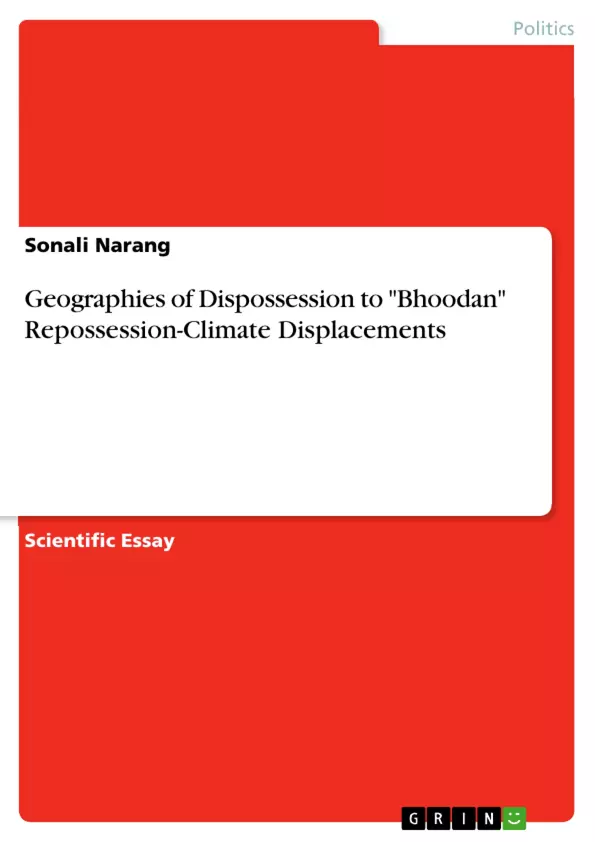The impact of Forced displacement in South Asia will lead to scarcity and dispossession of land and create ‘spaces of exception’ and ‘spaces of exclusion’. Such dispossession will create new ‘global souls’ [climate Refugees] and new social-cultural geographies of identity determined and organised on the basic of catastrophic climatic events. The momentous rejoinder to climate change will require sacrifices, strong regional Institutions with accurate governance and cooperation across multiple scales. Hitherto, the land management policies of the State in South Asia have failed in supporting the commons and the livelihoods options of the citizens and non-citizens alike. With emerging discourse of climate change new land management policies are indispensable that will further demand committed leadership and powerful regulation. The goal of this paper is to analyses the relevance of Bhoodan movement as an institution to govern the common property management and the use of natural resources in a sustainable way. This paper will further look into how this concept can be used inter-state or intra-state within South Asia towards climate displaced community across multiple logics of dispossession, violence and insecurity and where wider socio-economic, political and legal struggles come together and understand that whether it would be able to provide land and dignity to millions who will be crossing edge in search of protected lands and livelihood.
Inhaltsverzeichnis (Table of Contents)
- Introduction
- Dispossession of climate geographies
- Role of the State and Climate displacements
- Climate induced assimilation – The Battle for land and [Law] in South Asian Region
- Governing of Climate displacements: The Bhoodan Way
- Conclusions
Zielsetzung und Themenschwerpunkte (Objectives and Key Themes)
This paper aims to analyze the relevance of the Bhoodan movement as an institution to govern common property management and the use of natural resources in a sustainable way. It explores how this concept can be applied within South Asia to address the needs of climate-displaced communities across various logics of dispossession, violence, and insecurity.
- The impact of climate change on land and livelihoods in South Asia
- The role of the state in addressing climate displacements
- The potential of the Bhoodan movement as a solution for climate displacement
- The complexities of land rights and access in the context of climate change
- The challenges and opportunities for inter-state and intra-state cooperation in addressing climate displacement
Zusammenfassung der Kapitel (Chapter Summaries)
- Introduction: This chapter establishes the link between climate change and the dispossession and repossession of land in South Asia, highlighting the urgency of addressing the issue of climate displacement through initiatives like the Bhoodan movement.
- Dispossession of Climate Geographies: This chapter explores the multifaceted impact of climate change on South Asia, focusing on the vulnerability of coastal communities and ecosystems. It emphasizes the challenges posed by rising sea levels, extreme weather events, and the resulting displacement of populations.
- Role of the State and Climate Displacements: This chapter examines the role of the state in addressing climate displacement, highlighting the challenges of managing migration flows and providing support to displaced communities. It also discusses the potential for international cooperation in resettlement policies.
Schlüsselwörter (Keywords)
The key themes and concepts explored in this paper include climate change, land dispossession, climate displacement, South Asia, Bhoodan movement, common property management, and sustainable resource use.
Frequently Asked Questions
What are "Climate Refugees"?
These are "global souls" displaced from their lands due to catastrophic climatic events like rising sea levels or extreme weather.
What is the Bhoodan movement?
Originally a land gift movement in India, this paper analyzes its relevance as an institution to govern common property for displaced people.
How does climate change affect land rights in South Asia?
It leads to the dispossession of land, creating "spaces of exception" where traditional land management policies often fail the citizens.
Can the Bhoodan concept work for inter-state displacement?
The paper explores if this concept can be used to provide land and dignity to millions crossing borders due to environmental insecurity.
Why is state cooperation across South Asia indispensable?
Effective response to climate displacement requires strong regional institutions, accurate governance, and cooperation across multiple scales.
- Citar trabajo
- Dr Sonali Narang (Autor), 2017, Geographies of Dispossession to "Bhoodan" Repossession-Climate Displacements, Múnich, GRIN Verlag, https://www.grin.com/document/374152



